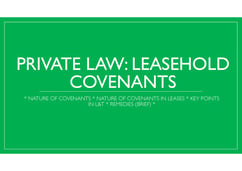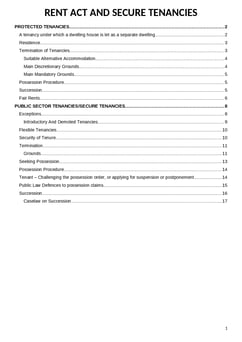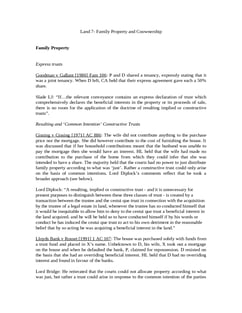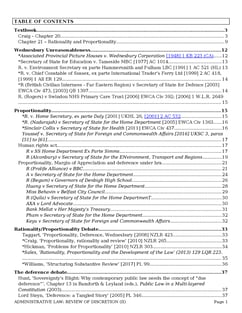- Law Cases
- Administrative Law Cases
- The Human Rights Act 1998 impact on administrative law; Human Rights in the UK Cases
Ghaidan v Godin-Mendoza [2004] UKHL 30; 3 W.L.R. 113
Judgement for the case Ghaidan v Godin-Mendoza
KEY POINTS
Rent restrictions typically apply when a tenant passes away, regardless of their sexual orientation or relationship status. The tenant's partner, in a homosexual relationship, can have legal rights and responsibilities depending on various factors, including the nature of their cohabitation.
Whether a man living with a tenant in a homosexual relationship can be considered living with the tenant as "his ... wife or husband" depends on specific legal definitions and criteria within the relevant jurisdiction's laws.
Eligibility for either a statutory tenant or an assured tenancy by succession may depend on local housing regulations and individual circumstances. Legal rights can vary widely, and seeking legal advice is essential to determine entitlement.
Discrimination against same-sex relationships is generally not reasonably justified and may contravene human rights principles. Legal frameworks often seek to uphold equal treatment and nondiscrimination.
The interpretation and enforcement of legislation like the Rent Act 1977 should align with Convention rights and human rights principles, ensuring compatibility and fairness in housing regulations. Courts may consider these rights when adjudicating related cases.
FACTS
The defendant had been in a long-term homosexual relationship with the tenant of a flat. After the tenant's death, the claimant, who owned the flat, sought possession. The court initially ruled that the defendant did not qualify as the surviving spouse under the Rent Act 1977 but was entitled to an assured tenancy by succession as a family member.
The defendant appealed, arguing that the law unfairly treated homosexual partners. The Court of Appeal agreed, citing violations of human rights laws. They reinterpreted the law to allow same-sex partners living as spouses to succeed to the tenancy.
The claimant appealed this decision.
JUDGEMENT
The appeal is dismissed. Paragraph 2(2) of Schedule 1, which treated survivors of homosexual partnerships less favorably than survivors of heterosexual partnerships without reasonable justification, violated the defendant's rights under Articles 8 and 14 of the Convention.
Section 3 of the 1998 Act mandates that legislation be interpreted in a Convention-compliant manner whenever possible, provided it aligns with the fundamental aspects of the legislative scheme.
It is feasible to interpret paragraph 2(2) in a way that eliminates discrimination against same-sex partners without conflicting with any fundamental principles of the 1977 Act. Consequently, the defendant is entitled to succeed to the statutory tenancy.
COMMENTARY
The case involved a homosexual partner seeking tenancy rights after the death of their partner. Initially denied spousal status under the Rent Act 1977, they were granted assured tenancy by succession as a family member.
Following an appeal, the Court of Appeal ruled that this distinction unfairly treated homosexual partners, violating human rights laws. They reinterpreted the law to rectify this discrimination.
The claimant appealed, but the court upheld the reinterpretation, granting the defendant the right to succeed to the statutory tenancy.
ORIGINAL ANALYSIS
A was in a homosexual relationship with B who had a protected tenancy. B died and under the Rent Acts a partner acting as a husband or spouse who was living with him was entitled to an assured tenancy.
HL ruled that in order to make the act compatible with convention rights, they would make a s.3 interpretation so as to say that homosexual couples can also count as “spouses”.
S.3 usage does not depend on their being some ambiguity in legislation.
Lord Nicholls
He said that to exclude homosexuals would be to make the act incompatible with article 14 (non-discrimination). He says there is difficulty in deciding what s.3 HRA means by “as far as possible”.
He accepts Steyn’s view in R v A (no.2) and says S.3 is unusually far-reaching: Parliament, in passing the HRA 1998, is consenting to the courts modifying an act’s meaning as far as possible so as to make it compatible with convention rights, even if this goes against the clearly intent of parliament.
Use of s.3 does not rely on their being some ambiguity in legislation - that would render its usage “a semantic lottery”. However the meaning imported must be compatible with the underlying thrust of the legislation construed & any word implied must be within the grain of the legislation.’
Lord Steyn
Says that the aim of HRA 1998 was to “bring rights home”, which only s.3 interpretation can do: the declaration cannot.
-
He reaffirms the need for s.4 to be treated as a last resort (it is NOT remedial).
Though it can lead to a change in the law which has the benefits of keeping clarity in the law, avoiding linguistic strain and allows an amendment to happen quickly by remedial order under s.10.
Lord Millett (dissenting)
Denied that s.3 could be used. The statute could not feasibly be given the meaning that the majority considered it to have.
He says that S.3 is NOT really conferring a “quasi-legislative” function rather than purely an interpretative one.
RELATED CASES
For Further Study on Ghaidan v Godin-Mendoza

A collection of the best Landlord and Tenant notes the director of Oxbr...

A collection of the best BPTC notes the director of Oxbridge Notes (an ...
Need instant answers? Our AI exam tutor is here to help.
Ask questions 🙋 Get answers 📔 It's simple 👁️👄👁️
Our AI is educated by the highest scoring students across all subjects and schools. Join hundreds of your peers today.
Get StartedSimilar Cases
Related Product Samples
These product samples contain the same concepts we cover in this case.


 Since 2010, Oxbridge Notes has been a trusted education marketplace, supplying high-quality materials from top achievers at universities like Oxford, Cambridge, LSE, Harvard, and Yale.
Since 2010, Oxbridge Notes has been a trusted education marketplace, supplying high-quality materials from top achievers at universities like Oxford, Cambridge, LSE, Harvard, and Yale.